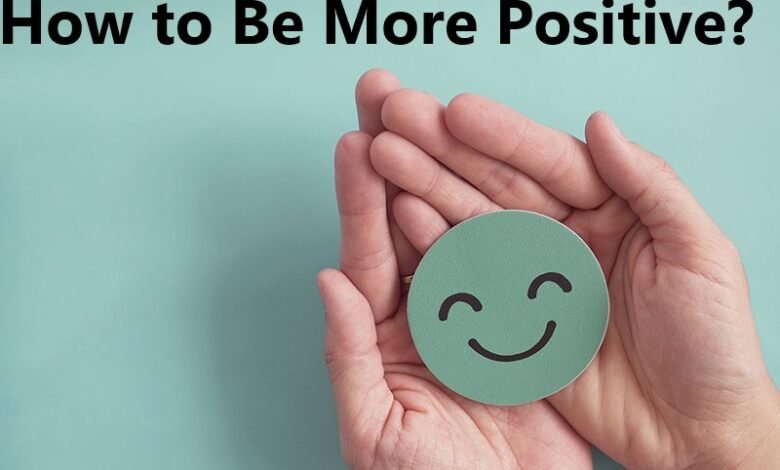How to Be More Positive

How to Be More Positive
In today’s fast-paced and often stressful world, it’s easy to get caught up in negativity. From the news to social media, there’s no shortage of things that can bring us down. But being negative can have a serious impact on our mental health, relationships, and overall well-being. If you’re looking to make a change and become more positive, here are some tips to get you started.
Practice Gratitude
One of the easiest ways to shift your focus from negativity to positivity is to practice gratitude. Take a few minutes each day to think about the things in your life that you’re grateful for. It could be something as simple as a warm cup of coffee or a beautiful sunrise. By focusing on the good things in your life, you’ll start to feel more positive.
Surround Yourself with Positive People
The people we surround ourselves with have a big impact on our mood and outlook on life. If you’re spending time with negative people, it’s easy to get caught up in their negativity. Seek out positive, supportive people who lift you and make you feel good about yourself.
Savor Anticipation
Savoring anticipation is the act of enjoying the positive feelings that come with looking forward to something exciting. Whether it’s a vacation, a special event, or even a favorite meal, anticipating something can bring a sense of excitement and joy to our lives. By savoring these feelings, we can extend the enjoyment of the experience and enhance our overall happiness.
Taking the time to appreciate the anticipation can also help us build resilience and cope with stress, as we have something positive to look forward to. So the next time you find yourself eagerly awaiting something, take a moment to savor the anticipation and relish in the positive emotions it brings.
Practice Mindfulness
Practicing mindfulness involves paying attention to the present moment without judgment. By being fully present at the moment and observing your thoughts, feelings, and surroundings, you can cultivate a greater sense of awareness and reduce stress and anxiety. To practice mindfulness, find a quiet space where you can sit comfortably and focus on your breath.
As thoughts enter your mind, acknowledge them without judgment and let them go, bringing your attention back to your breath. With regular practice, mindfulness can help you become more centered, focused, and present in your daily life.
Smile
Smiling is a simple and powerful way to improve your mood and boost your overall well-being. When you smile, your brain releases endorphins, which are natural feel-good chemicals that can help reduce stress and boost your mood. Smiling can also help you feel more relaxed, increase your confidence, and make you more approachable to others.
Even if you don’t feel like smiling, try doing it anyway – you might be surprised at how much better it makes you feel. So the next time you’re feeling down, try putting on a smile – it might just be the pick-me-up you need.
Practice Self-Care
Taking care of yourself is essential to maintaining a positive attitude. Make time for activities that make you feel good, such as exercise, reading, or taking a bath. Getting enough sleep, eating well, and taking care of your physical health will also help you feel more positive.
Focus on Solutions, Not Problems
When faced with a challenge, it’s easy to get bogged down in the problem. Instead, focus on finding a solution. This shift in focus can help you feel more in control and optimistic about the outcome.
Practice Mindfulness
Mindfulness is the practice of being present at the moment and paying attention to your thoughts and feelings without judgment. By practicing mindfulness, you can learn to let go of negative thoughts and focus on the present moment.
Laugh More
Laughter is truly the best medicine when it comes to positivity. Make time for activities that make you laugh, such as watching a funny movie or spending time with friends who make you smile. Laughing can help reduce stress and boost your mood.
Celebrate Small Wins
It’s easy to focus on the big goals we want to achieve, but celebrating small wins along the way can help us stay and motivated. Take time to acknowledge and celebrate your accomplishments, no matter how small they may seem.
In conclusion, becoming more positive takes time and effort, but it’s worth it. By practicing gratitude, surrounding yourself with people, taking care of yourself, focusing on solutions, practicing mindfulness, laughing more, and celebrating small wins, you can shift your mindset and live a more positive, fulfilling life.
Characteristics of Positive People
People tend to exhibit several characteristics that contribute to their optimistic outlook on life. Here are some common characteristics of positive people:
- Gratitude – Positive people are grateful for what they have, and they focus on the good things in their lives rather than dwelling on the negative.
- Resilience – Positive people are resilient and able to bounce back from setbacks and challenges.
- Optimism – Positive people have a positive outlook on life and believe that things will work out for the best.
- Empathy – Positive people are empathetic and compassionate towards others, and they seek to understand and support those around them.
- Kindness – Positive people are kind and generous, and they enjoy helping others and making a positive difference in the world.
- Self-care – Positive people prioritize self-care and make sure to take care of their physical, emotional, and mental health.
- Flexibility – Positive people are flexible and adaptable, and they are willing to change their approach when faced with obstacles or challenges.
By cultivating these characteristics, anyone can develop a more outlook on life and improve their overall well-being.
Benefits of Being Positive
Being have a multitude of benefits for your mental, emotional, and physical health. Here are some benefits of being positive:
- Improved mood – Positive people tend to experience more positive emotions and have a more optimistic outlook on life, which can lead to improved mood and overall happiness.
- Reduced stress – By focusing on the positive and practicing gratitude, positive people can reduce stress and anxiety in their lives.
- Better relationships – Positive people are often more approachable, empathetic, and compassionate, which can lead to stronger and more fulfilling relationships.
- Increased resilience – Positive people are better equipped to handle setbacks and challenges, as they have a more optimistic and adaptable mindset.
- Improved physical health – Positive people have been shown to have lower levels of stress hormones, better cardiovascular health, and a stronger immune system.
- Greater success – Positive people tend to have a can-do attitude and are more likely to take risks, which can lead to greater success in their personal and professional lives.
By focusing on the positive and cultivating a positive mindset, anyone can experience these benefits and improve their overall well-being.
Conclusion
In conclusion, being more have a significant impact on our overall well-being, relationships, and success. By practicing mindfulness, savoring anticipation, smiling, and cultivating positive characteristics like gratitude, resilience, and kindness, we can develop a more positive mindset and enjoy the many benefits that come with it.
It is important to remember that being positive is not about ignoring the negative aspects of life, but rather choosing to focus on the good and approaching challenges with a solution-oriented mindset. By making positivity a priority in our lives, we can improve our mental and physical health, build stronger relationships, and achieve greater success and happiness.
Frequently Asked Question
- Is it possible to be positive all the time?
While it’s not realistic to do all the time, we can cultivate a more mindset by focusing on the good things in our lives and approaching challenges with a solution-oriented mindset.
2. How can I stay positive during difficult times?
During difficult times, it’s important to practice self-care, seek support from loved ones, and focus on the things you can control. Practicing gratitude and mindfulness can also help you stay during challenging times.
3. What are some ways to cultivate positivity in my daily life?
You can cultivate positivity by practicing mindfulness, savoring anticipation, practicing gratitude, and surrounding yourself with people and environments. Engaging in activities that bring you joy and focusing on your strengths and accomplishments can also help you cultivate a mindset.
4. How long does it take to develop a more positive mindset?
Developing a mindset is a process that takes time and effort. It’s important to be patient with yourself and to practice habits consistently. Over time, you will begin to notice a shift in your mindset and outlook on life.
5. Can being positive improve my health and well-being?
Yes, research has shown that being can lead to improved mental and physical health, greater happiness, and more success in life. By focusing and cultivating a more optimistic mindset, you can experience these benefits and improve your overall well-being.











